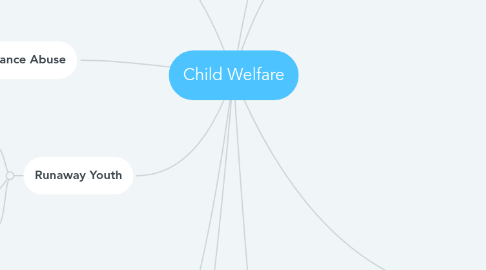
1. Mental Illness
1.1. How do parents with mental illness effect children?
1.2. How does a child with mental illness effect the family?
1.3. Is there a link between the onset of mental illness in children and when they first start using drugs/alcohol?
1.4. Is there a link between mental illness in children and poverty? If so, why?
2. Substance Abuse
2.1. How many cases a year is substance abuse from the parents reported?
2.2. Is there a correlation between substance abuse and childhood abuse?
3. Runaway Youth
3.1. What Is considered runaway youth?
3.2. Is there a link between runaway youth and the increased demand in human trafficking?
3.3. What are the laws that effect runaway youth?
4. Child Neglect
4.1. what is considered to be neglect?
4.1.1. How is child neglect confused with poverty?
4.1.1.1. Does being poor put a person at risk for having your child removed?
4.1.1.1.1. Could there be racial and ethnic consequences?
4.1.1.2. Are there set guidelines that define child neglect?
4.2. What are the different forms of child neglect?
4.2.1. Educational, Physical, Emotional, Medical
4.2.1.1. How are all of these alike? How are they different?
4.2.1.1.1. Is there a correlation between parental age and neglect?
4.2.1.1.2. Is there a likelihood of being neglected as a child and being a neglectful parent?
4.2.1.1.3. Do environmental factors and life stressors lead to neglect. i.e. divorce, death of a relative
4.3. What are the long-term effects of childhood neglect?
4.3.1. On identity development
4.3.2. On attachment
5. Human Trafficking
5.1. What is human trafficking?
5.2. How many children under 18 are part of human trafficking in the US?
6. Adoption
6.1. Why are more ethnic and racial children placed up for adoption than white children?
6.2. How many children in the US are in need of adoption?
6.3. what laws regulate adoption?
7. Fostering
7.1. Why are there racial disparities in the foster care system?
7.1.1. Is this a result of criminalizing the poor?
7.2. Is kinship care really the best method of care of when there is generational abuse?
7.2.1. What effects does kinship care have on the family? child, parent, relative
7.3. What laws effect fostering?
7.4. What are the regulations for foster families?
8. Child Abuse
8.1. What are the consequences and lingering trauma of childhood abuse
8.1.1. When does physical discipline ceases to be a parenting style and becomes abusive behavior that has long lasting consequences?
8.1.2. Are services offered and available to children in the child welfare system appropriate to meet their individual needs?
8.2. What constitutes child abuse
8.3. What happens to abuse children? Where do they go? What happens to the parent/s?
8.3.1. Foster Care?
8.3.2. Adoption?
8.3.3. Group homes?
8.3.4. Kinship?
8.4. Is there a relationship between children who suffer abuse and the outcome of mental illness later in life? Substance abuse?
8.4.1. What are the characteristics that cause this to happen in some cases but not in others?
8.5. Who are mandatory reporters?
8.5.1. What kind of training do mandatory reports have?
8.5.2. What is the process when a report is made?
8.5.2.1. Who is responsible for investigation?what kind of training is required?
8.6. Are there ways to prevent child abuse?
8.7. Why do certain factors result in abuse in some situations but not others?
8.8. what role does a community's acceptance of elevated violence or social attitudes about violence play in relation to rates of abuse?
8.9. To what extent are quality-improvement strategies in child welfare agencies well developed, implemented, effective, and sustained?
9. Adverse Childhood Experiences
9.1. What is ACEs?
9.1.1. Original study only looked at white middle class families. Is there a difference in the data for those of different races and ethnic backgrounds?
9.1.1.1. Is the data actually higher?
9.2. What are the long term effects of ACEs (Mentally, physically, emotional)?
9.2.1. ACEs can be compounded. The more ACEs the higher the likelihood of long term effects.
9.2.1.1. Why do some individuals experience long-term effects while others do not.
9.2.1.1.1. What factors protect these children from these poor outcomes?
9.3. What is the outcome of children who seek treatment or therapy for ACEs?
9.4. Is there a treatment for children who experience ACEs?
9.4.1. What are the treatments?
9.4.2. Exposure to intense prolonged toxic stress is linked to ACEs.
9.4.2.1. Mindfulness techniques be taught in schools to reduce the long-term effects of ACEs
9.5. Can ACEs become a National Trauma?
9.5.1. A lot of unresolved trauma is occurring on the micro level due to broader social macro issues
9.5.1.1. Can issues such as poverty, mass incarcerations, border separations etc cause a whole generation of traumatized people?
9.5.1.2. Can ACEs be generational?
